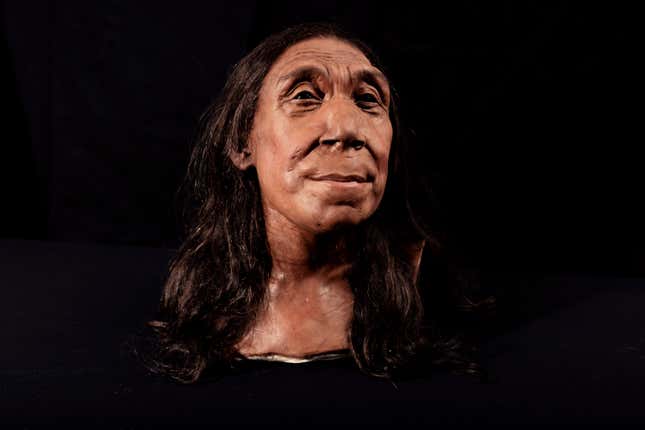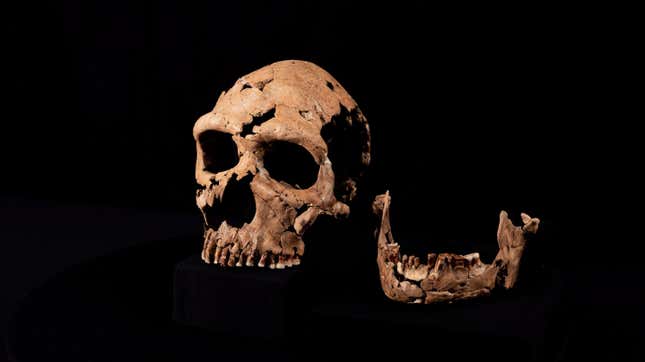A team of researchers used a flattened skull of a female Neanderthal who lived some 75,000 years ago to reconstruct the woman’s likeness, providing an uncannily vision of her appearance in life.
Neanderthals were a group of archaic humans that lived across Eurasia and disappeared from the fossil record about 40,000 years ago. They were barrel-chested, with prominent brows, and were shorter and stockier than modern humans. But they didn’t die out; Neanderthals interbred with humans, and an increasing body of evidence suggests that our nearest relatives in the hominin family tree were subsumed into the Homo sapiens gene pool. Today, Neanderthal DNA persists in human genomes, with the prevalence of Neanderthal DNA slightly higher in parts of eastern Asia.
The recently reconstructed female Neanderthal, named Shanidar Z, was found in Iraqi Kurdistan’s Shanidar Cave, a site that has yielded Neanderthal remains and tools since the 1950s. By the team’s estimation, the woman was older—in her mid-40s, perhaps—and stood at around five feet tall, according to a University of Cambridge release.

Her skull was fragmented into hundreds of pieces, having been flattened by a rockfall and sediment that fell on top of it. A 2020 paper described the discovery of the skull, noting it was “crushed until almost flat,” though the woman was evidently laid down next to a gully hollowed by hand to let water run through it. She was laid on her side with a rock below her head and her left hand under her head—the same kind of position you might take when you sleep.
“The body of Shanidar Z was within arm’s reach of living individuals cooking with fire and eating,” said Emma Pomeroy, a paleoanthropologist at the University of Cambridge and a member of the team that first described Shanidar Z, in the same release. “For these Neanderthals, there does not appear to be that clear separation between life and death.”
The woman’s reconstruction was made by the Kennis brothers, a duo who specialize in making lifelike reconstructions of our human forbears. To make the reconstruction, the skull was painstakingly reconstructed from its hundreds of bony fragments, and was then scanned and 3D-printed. The Kennis brothers than used fabricated muscle and skin to build the face.

Our understanding of Neanderthals has changed considerably in recent decades. Once imagined as brutish, we now know that Neanderthals were intelligent and had strong social networks; they cared for their injured and treated wounded members of their communities. Fittingly, evidence for those practices also came from Shanidar Cave.
In 2020, the same team found a Neanderthal skeleton in the cave that seemed to have been intentionally buried with plant matter; a paper published in November 2023 complicated the initial conclusions, finding that some of the pollen found on the site may have been deposited by bees, not mourning Neanderthals. But some of the remains in Shanidar Cave are thousands of years apart in the fossil record, indicating that the shelter was used by generations of Neanderthals.
Neanderthals’ story continues to be retold, with ever-increasing nuance and insight. As we excavate more Neanderthal sites, with technology that better extracts all the data from the setting, we’ll understand what we (kind of) already know: Neanderthals were a lot like us, so much so that they became us.





















+ There are no comments
Add yours